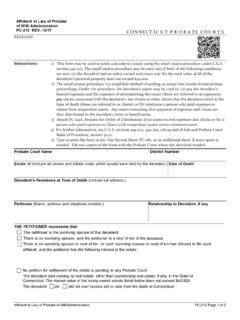Transcription of How to make a payment in lieu of notice - Remedy for Business
1 To make a payment in lieu of noticeFor more information or to request a demonstration Call 020 8652 4653 (quote payment in lieu of notice )Email Go to XpertHR s book a demo formGenerally a contract of employment can be terminated by either side giving the appropriate notice to the other party. However, in some circumstances an employer may wish to dismiss an employee without notice and make a payment in lieu of notice instead. This may be appropriate in a redundancy case or where an employee is being dismissed following a capability process. This XpertHR Professional how to guide steers employers through the issues they need to consider when making a payment in lieu of guide covers: What is a payment in lieu of notice ?
2 Contractual provision for payment in lieu of notice When is a payment in lieu of notice appropriate? Should a compromise agreement be used with a payment in lieu of notice ? When is a period of garden leave more appropriate than a payment in lieu of notice ? Confidential information and company property Making the payment in lieu of notice Benefits in kind payment for holiday entitlement that would have accrued during the notice period Calculation of redundancy payments where a payment is made in lieu of notice Taxation of payments where there is no PILON clause in the contract Taxation of payments made under a PILON clause Plus XpertHR Liveflo see how our revolutionary online HR tool can help you handle HR is a payment in lieu of notice ?
3 The general rule is that a contract of employment can be terminated by either side giving the appropriate notice to the other party. The length of such notice is generally set out in the contract of employment and must be included in the employee s statement of terms and conditions of employment. In the absence of a specific contractual clause, the courts will imply a term allowing the contract to be terminated on the giving of reasonable notice . Section 86 of the Employment Rights Act 1996 also imposes a minimum period of notice , which will apply if it is longer than that provided for in the contract. Terminating the contract without giving the appropriate notice will be a breach of contract (unless there is a contractual provision allowing for this) and will give rise to a claim for damages.
4 Damages for breach of contract are based on putting the employee in the position in which he or she would have been if the contract had been performed properly. In the context of dismissal this means that the employee must receive the money that he or she would have received had the employer given proper notice . Therefore, at its simplest level, a payment in lieu of notice is the payment made by the employer to cover the damages for the breach of contract involved in terminating the contract without giving proper notice . If the employee is guilty of gross misconduct, the employer is under no obligation to give notice at all and can summarily dismiss the employee. In these circumstances there is no breach of contract and no entitlement to notice pay.
5 Contractual provision for payment in lieu of noticeThe standard analysis that a payment in lieu of notice is a form of damages for breach of contract does not apply if the contract of employment specifically provides that the employer can terminate it by making a payment in lieu of notice . In such circumstances there is no breach of contract when the dismissal takes effect and the payment is simply a sum due under the contract. The key advantage of this is that it allows the immediate termination of the contract without affecting the validity of any post-employment restrictions, such as non-competition and non-solicitation clauses. Since these are part of the contract, they generally cannot be enforced by a party that has repudiated that contract through a fundamental breach, such as terminating the contract without notice .
6 A payment in lieu of notice clause (PILON clause) makes it clear that termination without notice is not a breach of contract, provided that the employer makes the correct payment to the PILON clause may also define the scope of the payment in lieu of notice in a way that is narrower than the normal calculation of damages for breach of contract, for example by limiting the payment to basic pay only, excluding any non-cash benefits to which the employee would otherwise be entitled. Therefore, it has the advantage of preventing arguments about what should or should not be included in the payment , which can be a particular problem in relation to jobs with complicated remuneration provisions or valuable benefits in kind.
7 The main disadvantage of a PILON clause is that payments made under it form part of the employee s contractual remuneration and fall to be taxed accordingly (see Taxation of payments made under a PILON clause). When is a payment in lieu of notice appropriate? An employer should make a payment in lieu of notice when it wishes to terminate the contract of an employee without giving the notice due under the contract, unless the dismissal is in response to gross misconduct on the part of the dismissing an employee, the employer must decide whether to dismiss him or her with no notice , partial notice or full notice . In this context, a dismissal notice does not mean a dismissal without warning, consultation or discussion.
8 A dismissal out of the blue is highly likely to be unfair and the employer may well be liable for compensation going well beyond payment for the notice period. payment in lieu of notice is particularly common in redundancy cases where there has already been consultation prior to the dismissal. Once the employer has taken the decision to dismiss, there is often little value to either the employer or the employee in the employee working out his or her notice , so an immediate cessation of the employment may be payment in lieu of notice may also be appropriate where dismissal follows a capability process. This may provide for a more dignified exit for the employee than if he or she were to continue to work, and the employer may feel that the contribution from the employee during the notice period is likely to be limited.
9 Employers should take care to ensure that there is clarity about exactly when the contract of employment ends. The dismissal letter should specify a date that is the last day of employment. The employer should pay the employee s pay and benefits in the normal way up to that date and make a payment in lieu of notice for any sums that would become due in the notice period. In general, a payment in lieu of notice is appropriate only when the contract is ending immediately. Therefore, subject to any restrictive covenants in the contract (for example, limiting the employee s ability to work for a competitor within a fixed period following the end of the employment), the employee will be free to work for another employer during what would otherwise have been the notice covenants are likely to be unenforceable if the employer has breached the contract by failing to give proper notice .
10 However, if there is a PILON clause in the contract, the termination will not amount to a breach and the validity of the restrictive covenants will not be affected. Should a compromise agreement be used with a payment in lieu of notice ?When dismissing an employee with a payment in lieu of notice , the employer should consider whether or not it would be appropriate to seek to enter into a compromise agreement with the employee. If the employer is simply paying the minimum amount due to the employee on termination it is unlikely that the employee would be prepared to sign a compromise agreement in full and final settlement of all potential employment tribunal claims. However, where the payment in lieu of notice is accompanied by additional payments designed to compensate the employee, over and above his or her contractual entitlement, it is normal to provide for the payment in lieu of notice as part of a compromise agreement.








